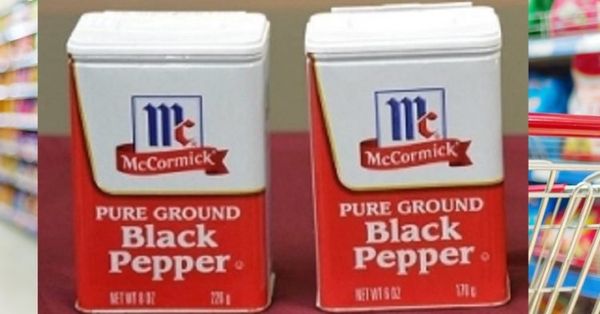A federal judge has decided to move forward with a lawsuit against popular spice maker McCormick & Co., despite the company’s protests. The lawsuit revolves around the size of McCormick’s ground pepper tins.

Last year, Watkins Inc., a smaller player in the spice industry, filed a lawsuit against McCormick, alleging that they had reduced the amount of pepper in their tins by 25% while maintaining the same tin size. The old McCormick tins contained about 8 ounces of ground pepper, whereas the new ones contain only about 6 ounces.
Although the quantity of pepper has been reduced, the size of the tin has stayed the same. Watkins claims that McCormick is using a visual trick to make it appear as if they are selling more pepper per tin than they actually are.
Both Watkins and McCormick sell the same product, but with different marketing techniques. McCormick uses non-see-through containers that obscure the amount of product inside, while Watkins has a smaller-sized container that still contains the same amount as McCormick’s. Watkins is suing McCormick, arguing that they are trying to deceive customers and gain an unfair advantage over their competition without actually improving their product.
Interestingly, while the McCormick tins do state the amount of pepper they contain, the “6 oz.” marker is small and could be easily overlooked. This tactic is known as “slack-filling,” or underfilling, which Watkins claims is a deceptive practice and a breach of consumer protection laws.
Watkins asserts that McCormick’s deceptive marketing practices have negatively impacted their sales. When customers compare the containers of pepper, they naturally assume that they are getting more black pepper at a better price with McCormick’s. However, the reality is that, although the tins are not the same size, they do contain the same amount of black pepper.
McCormick has defended itself by stating that since the amount of pepper is clearly labeled on their tins, they cannot be held responsible for what others consider deceptive marketing. However, many do not agree with this defense. In addition to the Watkins lawsuit, angry customers who bought McCormick’s new tins of pepper have filed a class-action lawsuit, claiming they were deceived. Both cases are currently progressing through the federal court system.
This entire situation highlights the importance of trustworthiness for corporations. Businesses that can establish a strong brand of trust and foster good community relations tend to be more successful. Actions like McCormick’s can harm reputations and make it challenging for consumers to trust the products being sold. So, before your next trip to the grocery store, remember to pay attention to the difference between McCormick’s two tins of pepper.





